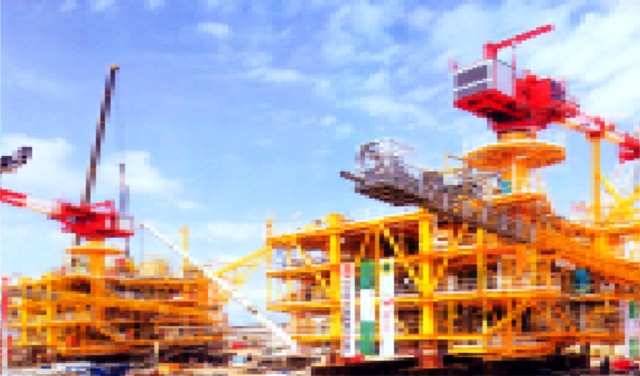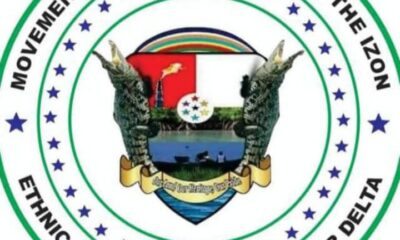Oil & Energy
‘Egina, Pushing Nigerian Content Frontier’

Being a text of a keynote address by the Deputy Managing Director, Deep Water, Total Upstream Companies in Nigeria, Mr. Ahmadu-Kida Musa, at the Nigeria Oil & Gas Conference & Exhibition (NOG) 2018, held at ICC, Abuja, July 2, 2018.
The theme of this
seminar, “Nigerian Content: The Next Frontier” is relevant for understanding the need to drive the Nigerian oil and gas industry towards sustainable development and growth. It is also an opportunity to discuss important issues the industry may be grappling with as it tries to assume a more local approach in its activities.
I am, therefore, rather delighted to speak about the modest Nigerian Content efforts at Total and what is seen as the next frontier for the industry in terms of in-country activities. You must, however, forgive me, if you find that, in the course of my speech, I keep returning to my current favourite subject, namely, the Egina Project.
Egina Project was sanctioned in 2013, three years after the Nigerian Oil and Gas Industry Content Development Act was signed into law, but It is important to look back at where the sector was to enable us appreciate achievements recorded.
And today’s achievements will be the second part. I will look at the Industry’s post-NOGICD response and what progress was made in advancing Nigerian Content.
The last part will focus on the next frontier for the industry in this area and, with that, we shall wrap up this conversation on a subject I find very interesting.
PRE-NOGICD ACT 2010
Until a few decades ago, the key players in almost all the key sectors of Nigeria’s oil and gas industry were the international oil companies. From exploration to production, refining and trading, the main actors were foreign multinationals.
Oil blocks and assets were owned by foreign oil majors and oil service contracts for engineering, drilling, wireline logging services, supply of safety equipment, construction & fabrication, etc. were largely awarded to foreign owned companies. All these companies were, of course, managed by foreign personnel especially for technical positions. Many project teams were based abroad and only a few Nigerians were lucky enough to be trained abroad or to work abroad, to acquire the relevant technical knowledge and experience necessary to take up key positions in Nigeria.
But by the 1990s, Nigeria joined other emerging economies who sought to take ownership and control of their natural resources for exploitation and transformation into economic development.
To achieve this, some of these emerging economies began to formulate policies and legislation that would compel economic actors to adopt policies that promoted local over foreign.
In 2005, Nigeria took what many analysts consider the most significant step towards Nigerian Content by introducing what was known as the Local Content Policy. As you well know, the main thrust of this Local Content Policy was to promote a framework for which local competencies in the oil and gas sector will be developed through the active involvement of Nigerians using local resources.
The intention of the government, at the time, was to use the local content Policy as a means of discouraging capital flight in the oil and gas industry.
At that time, the Nigerian Government’s Local Content Policy implementation was administered by guidelines issued by the regulatory agencies such as the Department of Petroleum Resources (DPR) and the Nigerian Content Division of the Nigerian National Petroleum Corporation (NNPC).
With this, the industry started to take some steps to embrace Nigerian Content. Some partnered with local contractors on low-risk projects because of concerns about quality and the availability of local capacity. Others embarked on some capacity building efforts, setting up training schools or supporting the upgrade of local yards to manage certain workscopes. Indeed, it has been said that before the Nigerian Oil and Gas Industry Content Development Act came into effect, many industry players approached Nigerian Content as a matter of Corporate Social Responsibility.
Nigerian content was carried out at the discretion of the individual company and often dependent on availability of funding and previous experience with local contractors and partners. Nigerian Content was not really seen as an obligation by many operators. It was often something that was done as an expression of goodwill.
However, there were of course some companies that realised that developing local competencies was a key to sustainability in the future.
It was during this pre-NOGICD period that Total decided to invest in the establishment of a world class petroleum training institution right here in Nigeria; showing its commitment to capacity building and the development of Nigerian Content.
The Institute of Petroleum Studies (IPS), Port Harcourt, was established in a unique tripartite collaboration with the University of Port Harcourt, Nigeria, the French Petroleum Institute, IFP, France and the NNPC/Total E&P Joint Venture.
The institute has consistently produced highly skilled manpower equipped with both the intellectual and technical competencies required in the oil and gas industry. Since its establishment in 2003, IPS has produced over 400 Master of Science graduates and about the same number of Engineering Diploma degree holders; many of whom have filled key positions in various oil and gas companies in Nigeria!
On Total’s projects, Nigerian Content was already a major component before the NOGICD ACT. The Akpo Project, which was sanctioned in 2005 recorded a cumulative Nigerian Content performance of 44%. In 2008, the FID was taken on the Usan Project and by the time the project was completed, the Nigerian Content record had climbed up to 60%.
The point here is that even before Nigerian Content became a matter of law, some in the industry were already on board
POST-NOGICD ACT 2010
On April 22, 2010, the way the business of oil and gas was done in Nigeria changed. That was the day the Nigerian Oil & Gas Industry Content Development Act was signed into law. And the industry, which had already started to embrace the objectives and ideals of Nigerian Content, needed to double its efforts.
The NOGICD Act ushered in an era where in-country value became the focus. With the government now leading the charge with legislation and efficient monitoring through the NCBMB, things began to change more rapidly.
The underlying philosophy and objectives of Nigerian Content today include a focus on:
In-country competency development, technology development , job creation, revenue retention, research and developmentas well as industrialisation.
The relationship between the Nigerian Content Monitoring & Development Board (NCDMB) and the Industry is that of partners who understand that their goal is the same: local capacity means more robust bottom lines for the Industry and more value for the country as a whole.
In this context, more Nigerian owned engineering firms as well as construction and fabrication yards became more visible as important players in the industry. Many of them became strengthened to participate in FEED and eventually improved capacity fabrication yards began to compete for major development projects.
I must add though that a lot of oil and gas Companies were sceptical of the final destination of this new found impetus by Nigeria on local content.
Oil & Energy
FG Explains Sulphur Content Review In Diesel Production
The Federal Government has offered explanation with regard to recent changes to fuel sulphur content standards for diesel.
The Government said the change was part of a regional harmonisation effort, not a relaxation of regulations for local refineries.
The Chief Executive, Nigerian Midstream and Downstream Petroleum Regulatory Authority (NMDPRA), Farouk Ahmed, told newsmen that the move was only adhering to a 2020 decision by the Economic Community of West African States (ECOWAS) which mandated a gradual shift to cleaner fuels across the region.
Ahmed said the new limits comply with the decision by ECOWAS that mandated stricter fuel specifications, with enforcement starting in January 2021 for non-ECOWAS imports and January 2025 for ECOWAS refineries.
“We are merely implementing the ECOWAS decision adopted in 2020. So, a local refinery with a 650 ppm sulphur in its product is permissible and safe under the ECOWAS rule until January next year where a uniform standard would apply to both the locally refined and imported products outside West Africa”, Ahmed said.
He said importers were notified of the progressive reduction in allowable sulphur content, reaching 200 ppm this month from 300 ppm in February, well before the giant Dangote refinery began supplying diesel.
Recall that an S&P Global report, last week, noted a significant shift in the West African fuel market after Nigeria altered its maximum diesel sulphur content from 200 parts per million (ppm) to around 650 ppm, sparking concerns it might be lowering its standards to accommodate domestically produced diesel which exceeds the 200 ppm cap.
High sulphur content in fuels can damage engines and contribute to air pollution. Nevertheless, the ECOWAS rule currently allows locally produced fuel to have a higher sulphur content until January 2025.
At that point, a uniform standard of below 5 ppm will apply to both domestic refining and imports from outside West Africa.
Importers were previously permitted to bring in diesel with a sulphur content between 1,500 ppm and 3,000 ppm.
It would be noted that the shift to cleaner fuels aligns with global environmental efforts and ensures a level playing field for regional refiners.
Oil & Energy
PHED Implements April 2024 Supplementary Order To MYTO
The Port Harcourt Electricity Distribution (PHED) plc says it has commenced implementation of the April 2024 Supplementary Order to the MYTO in its franchise area while assuring customers of improved service delivery.
The Supplementary order, which took effect on April 3, 2024, emphasizes provisions of the MYTO applicable to customers on the Band A segment taking into consideration other favorable obligations by the service provider to Band A customers.
The Head, Corporate Communications of the company, Olubukola Ilvebare, revealed that under the new tariff regime, customers on Band A Feeders who typically receive a minimum supply of power for 20hours per day, would now be obliged to pay N225/kwh.
“According to the Order, this new tariff is modeled to cushion the effects of recent shifts in key economic indices such as inflation rates, foreign exchange rates, gas prices, as well as enable improved delivery of other responsibilities across the value chain which impact operational efficiencies and ability to reliably supply power to esteemed customers.
“PHED assures Band A customers of full compliance with the objectives of the new tariff order”, he stated.
Ilvebare also said the management team was committed to delivering of optimal and quality services in this cost reflective dispensation.
The PHED further informed its esteemed customers on the other service Bands of B, C D & E, that their tariff remains unchanged, adding that the recently implemented supplementary order was only APPLICABLE to customers on Band A Feeders.
Oil & Energy
PH Refinery: NNPCL Signs Agreement For 100,000bpd-Capacity Facility Construction

The Nigerian National Petroleum Company Ltd (NNPCL) has announced the signing of an agreement with African Refinery for a share subscription agreement with Port-Harcourt Refinery.
The agreement would see the co-location of a 100,000bpd refinery within the Port-Harcourt Refinery complex.
This was disclosed in a press statement on the company’s official X handle detailing the nitty-gritty of the deal.
According to the NNPCL, the new refinery, when operational, would produce PMS, AGO, ATK, LPG for both the local and international markets.
It stated, “NNPC Limited’s moves to boost local refining capacity witnessed a boost today with the signing of share subscription agreement between NNPC Limited and African Refinery Port Harcourt Limited for the co-location of a 100,000bpd capacity refinery within the PHRC complex.
“The signing of the agreement is a significant step towards setting in motion the process of building a new refinery which, when fully operational, will supply PMS, AGO, ATK, LPG, and other petroleum products to the local and international markets and provide employment opportunities for Nigerians.
By: Lady Godknows Ogbulu
-
Business3 days ago
‘Women Exclusion From Digital World Costs $1trn Worldwide’
-

 Niger Delta3 days ago
Niger Delta3 days agoCalabar-Itu Road: C’River Set To Compensate Property Owners
-

 Foreign3 days ago
Foreign3 days agoBiden Jabs Trump In Election-Year Toast At White House Correspondents’ Dinner
-

 Oil & Energy3 days ago
Oil & Energy3 days agoPH Refinery: NNPCL Signs Agreement For 100,000bpd-Capacity Facility Construction
-

 News3 days ago
News3 days agoSugar-Coated Infant Milk Not Registered, Sold In Nigeria -NAFDAC
-

 Maritime3 days ago
Maritime3 days agoShippers’ Council Registers 160 Port Operators
-

 Rivers3 days ago
Rivers3 days agoNDDC Board Performance Is A Launch Pad For Tinubu 2027 – Says MOSIEND …Says No Vacancy In Aso Rock
-

 Niger Delta3 days ago
Niger Delta3 days agoDiri, Others Task NDDC, MNDD On Collaboration …As Tinubu Promises East-West Road Completion

